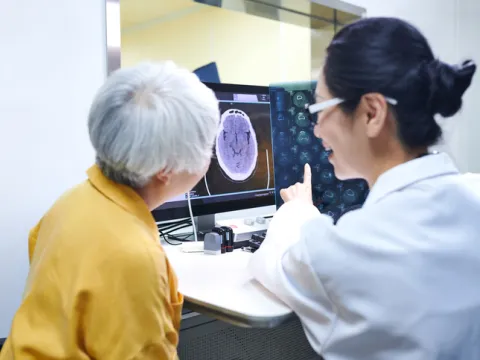- AdventHealth

Choose the health content that’s right for you, and get it delivered right in your inbox.
Under the leadership of principal investigator Ki Hyeong Lee, MD, MS, medical director of AdventHealth for Children’s pediatric epilepsy center in Orlando, AdventHealth Orlando has been one of two Florida sites participating in multi-center Phase II and extended study clinical trials to evaluate STK-001, an antisense oligonucleotide (ASO), designed to address the genetic cause of Dravet syndrome. A severe and progressive genetic epilepsy, Dravet syndrome is characterized by frequent, prolonged and refractory seizures that typically begin within the first year of life. Up to 20% of children and adolescents living with Dravet die before adulthood due to sudden unexplained death in epilepsy (SUDEP), prolonged seizures or seizure-related accidents.
Recently released data from two open-label Phase I/IIa studies and two open-label extension studies of children and adolescents ages 2 to 18 with Dravet syndrome who were treated with STK-001 showed clinically meaningful effects, including substantial and durable reductions in convulsive seizure frequency and improvements in multiple measures of cognition and behavior that support the potential for disease modification. Specific findings included the following:
- In the Phase I/IIa end-of-study data, 70 mg doses of STK-001 demonstrated substantial and sustained reductions in convulsive seizure frequency on top of the best available anti-seizure medicines. This included median reductions of 85% (n=10) at 3 months and 74% (n=9) at 6 months after the last dose.
- In the open-label extension studies, durable reductions in seizures and clinically meaningful improvements in multiple measures of cognition and behavior were maintained over 12 months with continued dosing at 30 mg and 45 mg.
- STK-001 was generally well-tolerated.
“These are groundbreaking studies because we are evaluating the first-ever medication designed to actually modify the disease course of Dravet Syndrome, a genetic cause of epilepsy,” shares Dr. Lee “For decades we have tried treating the symptoms — mainly seizure frequency and severity — with minimal success so the 74-85% reductions achieved so far with this new approach are significant and exciting.”
Dravet Syndrome and its Effects
A rare disease, Dravet syndrome impacts an estimated 1:15,700 infants in the U.S., and over 80% of those diagnosed carry a mutation in the sodium channel gene SCN1A, which results in a 50% decrease in expression of the Nav1.1 protein.
“Seizures are uncontrolled in 90% of people with Dravet syndrome, and children do not outgrow the condition,” explains Dr. Lee. “It is a horrible disease that typically begins around 3 to 4 months of age and results in tremendous suffering for patients and their families. Dravet also carries a high rate of premature death.”
Beyond seizures, additional complications of the disease that can negatively impact a patient’s quality of life include:
- Intellectual disability
- Developmental delays
- Movement and balance issues
- Language and speech disturbances
- Growth defects
- Sleep abnormalities
- Disruptions of the autonomic nervous system
- Mood disorders
Understanding the STK-001 Treatment Technology
STK-001 was designed by Stoke Therapeutics using their TANGO (Targeted Augmentation of Nuclear Gene Output) research platform. The researchers are targeting genetic diseases in which the patient has one functional copy of the gene and one mutated copy, causing the patient to produce only half the amount of protein needed. The genes are transcribed into pre-messenger RNA (pre-mRNA), and using TANGO, researchers design antisense oligonucleotides (ASOs) that bind to the pre-mRNA and help the healthy target gene to produce more protein. This increased protein output from the healthy gene compensates for the non-functioning copy of the gene.
Using TANGO, STK-001 was designed to upregulate NaV1.1 protein expression by leveraging the non-mutant (wild-type) copy of the SCN1A gene to restore physiological NaV1.1 levels, reducing both occurrence of seizures and the non-seizure comorbidities. Because STK-001 does not cross the blood-brain barrier, it is injected directly into the cerebrospinal fluid via a lumbar puncture (spinal tap). The U.S. Food and Drug Administration (FDA) has granted STK-001 orphan drug designation and rare pediatric disease designation as a potential new treatment for Dravet syndrome.
The Importance of Genetic Testing to Guide Epilepsy Treatment
Dr. Lee emphasizes the importance of genetic testing to properly diagnose and treat children with epilepsy.
“Epilepsy has many etiologies, and genetic mutation is one of the common causes in children. Early genetic evaluation helps us identify the root cause of the epilepsy, as in the case of Dravet syndrome, so that we can take the most targeted and effective treatment approach. Genetic testing is also critical to advancing care as researchers work to develop new precision medicine and gene-based therapies that could enhance outcomes and quality of life for our patients who suffer from epilepsy.”
Plans for Future Dravet Syndrome Research
Stoke Therapeutics has been meeting with regulatory agencies to discuss a randomized, controlled Phase III registrational study for STK-001 that includes initial doses of 70 mg followed by continued dosing at 45 mg. They hope to launch the trial later this year, and AdventHealth Orlando plans to participate when it becomes available.
“This is one of the most exciting medical developments in epilepsy care in more than 100 years,” comments Dr. Lee. “It is opening a new horizon, and if successful, this platform technology could lead to potential new disease-modifying treatments for other genetic neurological diseases as well. We are excited to be a part of pioneering research efforts that could significantly improve care for the patients and families we are privileged to serve.”
Recent News
Approximately 1 billion people throughout the world suffer from tinnitus (ringing in the ears), and it is the number one disability of those who serve in the U.S. military. The condition can disrupt...
Metabolic dysfunction associated steatotic liver disease (MASLD), formerly referred to as nonalcoholic fatty liver disease (NAFLD), affects about 70% of people with type 2 diabetes, placing them at...
AdventHealth East Orlando recently became the first hospital in Florida to earn Advanced Foot & Ankle Surgery Certification from DNV, a worldwide, independent certification body.
With an aging population and increases in the prevalence of neurological conditions like Alzheimer’s disease and dementia, physicians and patients alike continue to seek new tools and approaches to...
In a new article published in the medical journal Age and Ageing, AdventHealth Research Institute’s Dr. Audrey Collins shares the results of a recent study evaluating the impact of exercise on...
The AdventHealth Neuroscience Institute is the first in Florida and one of the first in the country to begin recruiting patients with primary progressive or non-active secondary progressive multiple...
Accurately determining food intake remains a challenge in nutrition research. A new study published in Nature Metabolism and co-authored by Dr. Corbin introduces a metagenomics-powered approach to...
Discover what’s being accomplished in Central Florida to bridge the health gap with Orange County Mayor Jerry Demings and AdventHealth’s Dr. Alric Simmonds.
Breakthrough device offers new hope for stroke survivors struggling with rehabilitation following ischemic stroke
Jennifer Seminerio, MD, recently became one of the first in Florida to use intestinal ultrasound (IUS) to help assess and manage treatment of patients with inflammatory bowel disease (IBD). A non...
The Convergent Hybrid Ablation procedure has been gaining acceptance as an effective treatment option for long-standing persistent atrial fibrillation (AFib) since the CONVERGE trial data published in...
Recently, AdventHealth for Children pediatric orthopedic surgeon Sean Keyes, DO, Katelyn Smith, PA-C, and their team performed their 100th bridge-enhanced anterior cruciate ligament (ACL) repair (BEAR...












